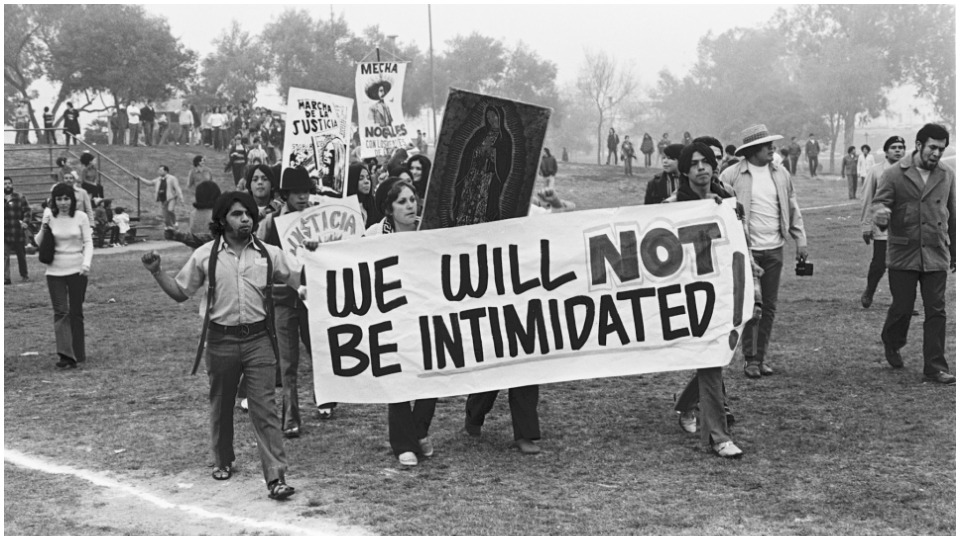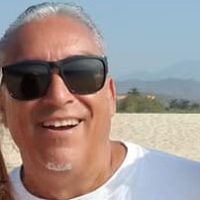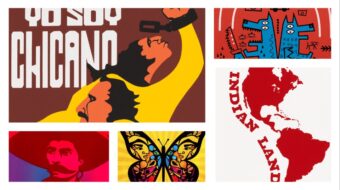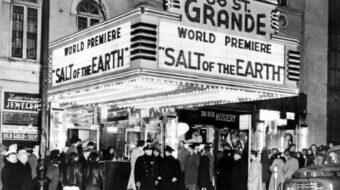
For the Latino community the question should not be “Should I vote?” The question to be asking is what is the best option for my vote? There are so many honest reasons why voting out the president and taking back the Senate is the best option. This article would have to be much, much longer to give all the reasons. You simply must ask yourself as a Latino living in America, “Do I feel safe, more prosperous, are there opportunities for my family, friends, and community, can I remain healthy under the current pandemic?” As a Latino, I can frankly say, not under the current president and his administration.
In the upcoming election this Nov. 3rd, it is important to start preparing early to register as a voter, thinking about whether to drive or walk to the polls (with mask!), or mail in your ballot, which is an easy, safe, and secure way to vote. For the Latino community, this election is critical. An incumbent president who is viewed by many as a racist because of his rhetoric and conduct is creating extreme hardship not only for our communities but for our nation and indeed the world. Needless to say, his decision-making is harmful and dangerous. This president should not hold the highest, most powerful office in our national political system.
Right now, the only way to eradicate poor decision-making by the president is to vote him out and defeat all the allies that support him. He has proven that he is not fit to be president. But our vote must count.
Today, voter suppression is being intensified daily by an oppressive anti-worker, anti-democratic administration. It takes many forms: Being kicked off the voting rolls for not having voted in the last several elections, or for having a name similar to someone in another state, or because the secretary of state just didn’t bother to inscribe the last few months’ worth of voter registrations on the rolls, or because people in some states can now actually be fined if they sign up new voters and a single spelling mistake is found, or because you didn’t get automatic voter registration at the DMV (closed), or for not having responded to a postcard asking for address verification, or for having been evicted from your last address. Or for having the bad luck of living in a city where there’s just one voting station now where there used to be fifty, and the line to vote is six hours long and your employer won’t pay you for the day. Or your long path to citizenship has been effectively blocked. Your vote is also suppressed when the census undercounts your existence, and therefore your representation is reduced.
The Latino community should not take the right to vote for granted. Many unsung heroes of the civil rights movement marched, suffered indignation, physical harm, and even death. The Latino community has always stood on the shoulders of individuals who fought for the right to vote. We are also a community of voters. We should defend the right to vote. Latinos need to vote.
Why should Latinos vote?
During World War II, an estimated 500,000 Latino men served in the Armed Forces. Latinas in the hundreds served in the Women’s Army Auxiliary Corps (WAACs) and the U.S. Navy’s Women Accepted for Volunteer Emergency Service (WAVES.) On the home front, segregation and discrimination continued. But in the Latino community, both men and women were expected to serve honorably without question in the various military sectors (Navy, Army, Marines) as well as support the entire war effort at home.
When the war ended, thousands of Latino soldiers came home expecting to be accepted in society as equal citizens. These young soldiers came home and asked the question, “What was the purpose of fighting the Nazis? Why did thousands die and suffer injury in joining the fight to destroy the Nazi regime?” Coming home was a big awakening. These soldiers found the same discrimination, segregation, unequal resources, and institutional racism as before, that remained the standard policies against all people of color in the United States.
In response, major Latino community groups organized to defend their community. This included the right to vote and political empowerment. Groups such as the Mexican Mutual Aid Societies of the 1900s, the 1940s El Congreso del Pueblo de Habla Española, the League of United Latin American Citizens (LULAC), a longtime civil rights group, the American G.I. Forum, and other grassroots organizations began to exercise their new community power. The first direct action was to address the lack of Latino representation and the lack of political empowerment on all levels of city, state, and national office.
This political action of demanding empowerment and representation continued as Latinos, men and women, went off to fight in the Korean War and Vietnam. Once again these Latino soldiers came home to discrimination and ongoing prejudice. The right to vote is an issue that is near and dear to the hearts and minds of those returning from America’s wars. In many cases, Latino veterans and community organizations began to organize and unite with other civil rights groups in their efforts to demand the right to vote.

Edward Roybal: Latino champion for voting rights
In 1947, Ed Roybal, a veteran, decided to run a grassroots campaign for the Los Angeles City Council. He was defeated. But his campaign galvanized an entire Latino community. Many Latinos came out to vote for the first time. The lack of resources and lack of campaign experience added to this difficult community defeat. The exercise of voting was so important that the Latino community developed new grassroots organizations with the sole purpose of empowering the community on the political level. A new era of enlightenment resulted out of all the community organizing. The right to vote became one of the central issues in the Latino community.
In 1949, Roybal decided to run for the Los Angeles City Council again. This time, his campaign was more organized and had more experienced operatives, with significant support from the organized Left. Large voter registration drives took place. A highly effective get-out-the-vote movement had tremendous success in bringing Latinos to the polls. According to Dr. Frank Breumen, author of Edward R. Roybal: The Mexican American Struggle for Political Empowerment, Roybal created a crusade against discrimination in housing, employment, and education. This time, Roybal won and was successfully reelected several times to the City Council.
Edward Royal was a champion of voting rights. Because of his leadership and political stewardship, the Latino community continued to move forward on voting and civil rights. Roybal would go on to get elected to Congress and serve 30 years in the House of Representation. Roybal is a constant reminder that change is possible and voting is one important instrument to use in bringing it about.
Mexican American Political Association
The Mexican American Political Association was established in the 1960s. The purpose of this organization was to help elect Latinos to public office as well as having the Latino community become entrenched in the civil rights movement. The right to vote was one of the main issues that MAPA organized around. Many of the young activists saw the vote as a powerful tool to secure representation and political empowerment for the Latino community.
In May of 1961, the MAPA program described the need for political representation as a central part of its agenda.
“We believe that the greatest need of the Mexican-American community today is to make itself heard, understood, and respected at every level of our government—and in all parts of our society. For 113 years the great Mexican-American community has been a part of California and of the United States, and yet in all that time not one of our community has ever sat in the State legislature, held a state-elected office, and seldom have Mexican Americans been found in county and city government. And no member of the United States Congress has ever been a Mexican American from California.
“It is MAPA’s aim to bring the Mexican-American community to its rightful place in all the councils of our government, to acquire the advantages of having representatives who will speak for us when decisions are made; and, most of all, to assume our share of responsibility as full-fledged citizens.”
MAPA took a giant step in organizing the Latino community. The continuous effort for voter mobilization was critical for laying the ground for local and national political involvement of the Latino community—another reminder of how important the right to vote and voting has become to the Latino community.
The Chicano and labor movements
In the 1960s and ’70s, military involvement, land grants, farmworker rights, worker rights, quality education, Chicano Studies, and political rights were some of the important issues taken up by activists in the Chicano Movement. Activist groups such as the student organization MECHA, Southwest Voter Registration Education Project, La Raza Unida, the Chicano Moratorium, the establishment of Chicano Studies, the Mexican American Legal Defense and Education Fund, CPUSA, as well as many other organizations both political and social, fought for and gained community empowerment. The Latino community saw that there was power in organizing. Today this trend of organizing for empowerment continues with the next generation of Latinx activists.

Latinos in the labor movement knew early on that what is accomplished at the bargaining table can be taken away in the halls of Congress and state governments. Leaders such as Emma Tenayuca, Luisa Moreno, Jessie de la Cruz, Dolores Huerta, César Chávez, Bert Corona and many others were on the front line of the struggle for civil rights, workers rights, and voting rights. Among these great activists lies a powerful truth. Organizing the community is as important today as ever before. Voting is as important today as ever before. Let us learn from history to understand why it is important for Latinos to vote.
Latinos fighting for civil rights, including the right to vote, have a long and glorious history. A long history of defending voting rights does not, however, guarantee that the right to vote is secured. Voting is a precious right not to be lost.
There have been many setbacks, and defeats too, but the struggle for the right to vote is a positive struggle. It’s the right struggle if our nation wants an integrated democracy. Latinos fighting for civil rights is not new and has been a part of the overall civil rights movement for a long time. The perpetual threat against voting rights should be a constant reminder that the vote should not be taken for granted. Understand that the Latino vote is a powerful tool in this election.












Comments